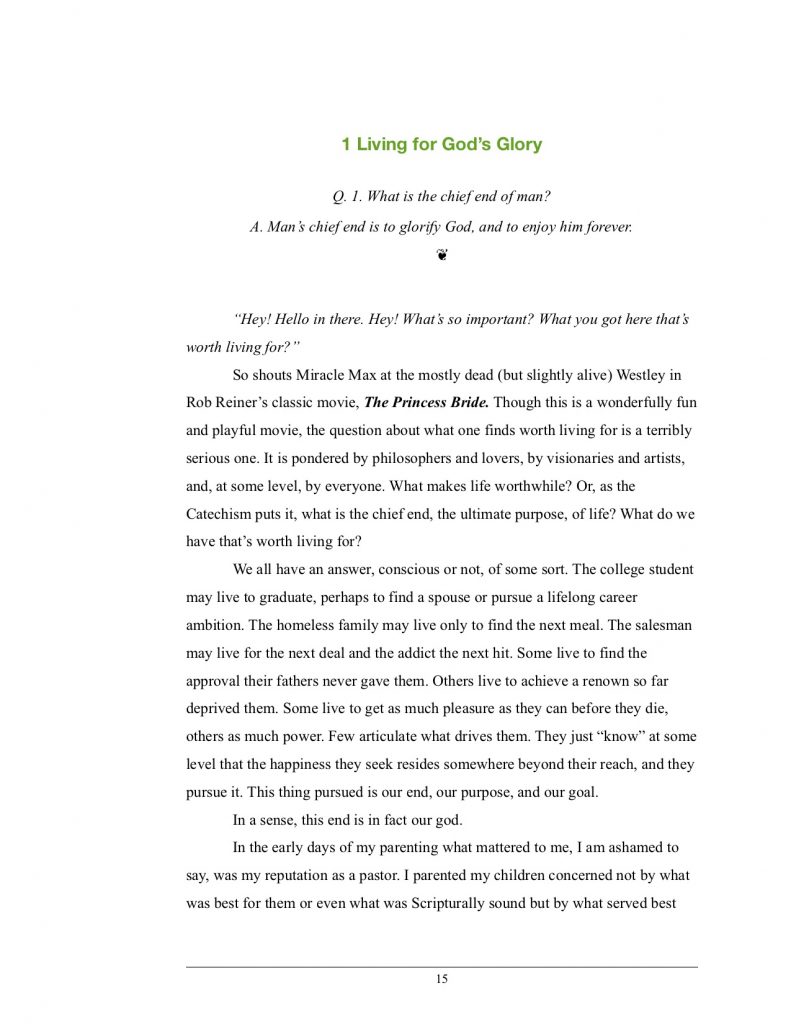[Note: the following is from the introduction to my as of yet unpublished book, Something Worth Living For. Feel free to spread this link far and wide, as you see fit. If you want to use the content in some other form, ask me. Thanks!]
❦
Q. 1. What is the chief end of man?
A. Man’s chief end is to glorify God, and to enjoy him forever.
❦
“Hey! Hello in there. Hey! What’s so important? What you got here that’s worth living for?”

So shouts Miracle Max at the mostly dead (but slightly alive) Westley in Rob Reiner’s classic movie, The Princess Bride. Though this is a wonderfully fun and playful movie, the question about what one finds worth living for is a terribly serious one. It is pondered by philosophers and lovers, by visionaries and artists, and, at some level, by everyone. What makes life worthwhile? Or, as the Catechism puts it, what is the chief end, the ultimate purpose, of life? What do we have that’s worth living for?
We all have an answer, conscious or not, of some sort. The college student may live to graduate, perhaps to find a spouse or pursue a lifelong career ambition. The homeless family may live only to find the next meal. The salesman may live for the next deal and the addict the next hit. Some live to find the approval their fathers never gave them. Others live to achieve a renown so far deprived them. Some live to get as much pleasure as they can before they die, others as much power. Few articulate what drives them. They just “know” at some level that the happiness they seek resides somewhere beyond their reach, and they pursue it. This thing pursued is our end, our purpose, and our goal.
In a sense, this end is in fact our god.
In the early days of my parenting what mattered to me, I am ashamed to say, was my reputation as a pastor. I parented my children concerned not by what was best for them or even what was Scripturally sound but by what served best my reputation as a ‘good pastor.’ My chief end, one might say, was to bring glory to my name and enjoy my reputation forever. This was never expressed and was never conscious. Yet this was the goal which drove me. It was the inadequate and unworthy god whom I served.
That thing for which we live is our god, and if we cherish the wrong god, an inadequate and false one, then serving that god will enslave us and lead us to disappointment. Only when we serve and cherish the true and living God will we find the joy and purpose for which we were created. Our chief and ultimate purpose, the only one that will not disappoint, is to live for the glory of God, and, in the end, to find our ultimate and complete enjoyment in him.
To develop the implications of this is the aim of the remaining questions and answers of the Catechism.
One shaped by a pursuit of God’s glory will bend every part of his life to that end. Johann Sebastian Bach inscribed at the bottom of many of his great musical manuscripts the initials “SDG,” a Latin symbol meaning, “to the glory of God alone.” That should be inscribed on every burger we grill and every email we send.
Living for God’s glory is the posture out of which people will find their greatest happiness. It is also the posture against which the deepest part of us tends to rebel. We prefer to think of ourselves as the masters of our own universe, which leads us to reject the claim of God over us, even if that claim comes as kindness.
It is the beauty of the biblical story outlined for us in the Catechism that God does not leave such rebels to their own chosen misery. He shows mercy to us in our rebellion, a mercy culminating in our being made “perfectly blessed in the full enjoying of God to all eternity.”
It is the knowledge of this mercy alone that can soften our cold, hard, rebellious hearts and replace them with hearts eager to see the glory of God alone as the one thing worth living for.

Carol Arnold
Great beginning and whets my appetite to read more. Well done.
Randy
Then, mission accomplished! Thanks.
Christine Finnegan
Lovely, and true. I can see reading this aloud with my hubby at night, even as we do Spurgeon right now, and being blessed and encouraged by it.
Randy
That’s some pretty exalted company to be in! Spurgeon, too! Thanks.
Suzanne
As one who was not introduced to the Catechisms until recent years, I appreciate your explanation. Thought provoking for sure. Looking forward to more to come.
Dwight Dolby
This is EXCELLENT! My own soul stirred. Thank you.
Randy
This means a lot for you to say so. Thanks.